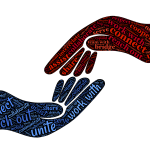In a time of redefining normal, it is important that we do not minimize the developmental milestones that children will still come across socially. Social development within the child is a work of adaptation. It is the child who must create his own social behavior within the context of his society. The child has an internal desire to adapt to the culture he is born into, based on that time and that place. It is through his interactions that the child absorbs the psychology of his family and culture, and this begins at birth.
According to Dr. Maria Montessori, during the ages 0-3 the family unit is often his whole world and he is dependent upon it for protection, provision, and a safe place to practice and develop freedom. He takes in what he is presented without prejudice and sets this as his foundation for “normal”. It is from here that he will compare new encounters and experiences.
During the ages 3-6, the child moves into a state of consciousness. He is still in a time of creation, but more stable and able to correct some negative experiences that he may have had during 0-3. During this time, the child builds up himself in many ways:
- he solidifies and stabilizes what he has absorbed
- his mind becomes a conscious learning tool
- he wants to do things and realizes he knows things
- he becomes conscious of himself, his actions, and his learning
- his experiences influence his behavior
- learning by doing is one of the fastest and most effective ways to acquire knowledge
- his experiences provide him with background knowledge that he can use for future situations and applications.
As a social being, he also develops his conscious will. This means he begins to overcome acting on impulse, which allows him to use his will to do things correctly, do the things his culture sees as “right” and choose self-control. By the end of this phase, he will have developed within himself what will become his personality. Although acquired with ease up to this point in his life, any personality changes after this may be difficult.
With all of the development occurring in the young child’s life, the environment is incredibly important. In my opinion, one of the best environments for the child was developed by Dr. Montessori. The Montessori prepared environment of the Casa (also called Primary) aids in the positive social development of the age 3-6 child.
- It provides safety for the child as well as others in the environment such as other children, animals, and the materials.
- Expectations and procedures are clear to the child, aiding him in making appropriate choices.
- The child is given freedom within limits.
While honoring the individuality of the child, he also learns that we are to keep in mind what is best for the whole, the overall community. The multi-age groupings of all Montessori classrooms, including the Casa, provide variety in roles, role models, and opportunities to practice role modeling.
It provides cultural variety and commonality across differences as well. The child is provided opportunities for movement in the body and in the mind. While scientifically developed, the materials in the classroom are limited. They lead the child to think further and beyond them. Independence is encouraged as much as possible and free choice is encouraged. There is mutual respect between the children for each other, respect from the adult to the child, respect from the child to the adult, and a respect for the environment as a whole. Grace and Courtesy is a direct social learning opportunity for the child. It is used to introduce specific elements of etiquette and social relations based on the culture the child is in. Role-play techniques offer opportunities for the child to practice the skills in a specific scenario, with hopes of increasing the likelihood that the skills will be used if encountered in daily life. It is the adult that is the keeper and protector of this environment and all that goes with it.
The experiences as this early age will support the child as he enters into preteen, teen, and young adulthood. This is where he prepares for entry into and establishment in adulthood. The child has become that man, searching for the answer to his internal question: “What will my contributing role in society be?” Much of this depends on what the child has within himself to offer. Therefore, we can see the importance of our role to assist the child throughout his life in reaching his highest potential. In doing so, we are helping the child become the man, a positive contributing member of his society.







